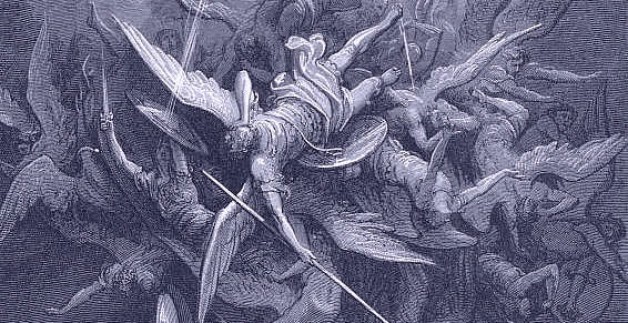Resplendent in majesty, unrivaled in excellence, the angel Lucifer reflected the glory of God more than any other creature. But for all his power and glory, the most noble of angels was like the lowliest wretch of a man in one respect: he did not enjoy perfect beatitude—he could not see God as He is in Himself. For this, he was as powerless as a worm, as helpless as a babe. The gift of divine intimacy could not be demanded, but only received with the loving submission of living faith. Refusing such submission, Lucifer grasped for the gift and spurned the giver. He desired to be like God, obtaining happiness by his own power, and in rejecting Love’s offer, he bent his will into the terrifying contours that spell eternal darkness.
Surprising as it may seem at first, Lucifer is not to be faulted simply for his quest to be Godlike, for he was created for eternal beatitude with God, a beatitude which entails the elevation of nature to a participation in the divine life. Herein lies the great tragedy, the greatest of all tragedies perhaps. As St. Anselm says, “He sought that to which he would have come had he stood fast.” If only he had “waited,” if only he had trusted the promise of Love’s offer, Lucifer would have become like God, sharing in the divine life.
The fall of Satan serves as an ominous warning for our age—an age marked with scorn for any kind of servitude and subjection. One more powerful than we has spurned love’s yoke to seize the same bliss we crave, and he now seeks to have us join his failed rebellion. Satan’s fall warns us of the limitation of any created power. No human machination or noble ideal will ever yield the beatitude for which we pine. It must be received on our knees, by creatures who, in the words of the poet Marcus Mumford, “know their ground.”
Knowing our ground means knowing when to wait. We want bliss and we want it now, but now is not the time for bliss. Now is the time of conversion, repentance, merit. Through faith in Jesus Christ, the Incarnate Son of God, we have a foretaste of heavenly blessing, but it remains a taste of what is to come. Let us not settle for anything less, and let us not try to seize what can only be received. Let us kneel down, know our ground, and wait for Him.
✠
Image: Gustave Dore, Paradise Lost: Book I, 44–49







